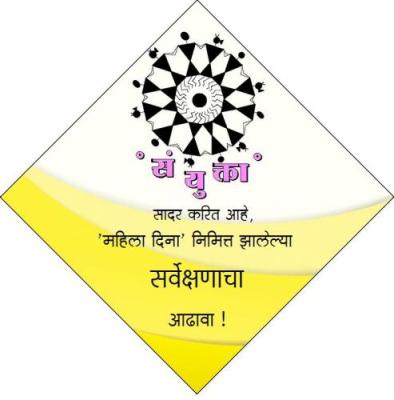
INTRODUCTION
On the occasion of Women’s Day 2010, ‘Sanyukta’, an exclusive women’s platform on www.maayboli.com, conducted a survey to encourage women to capture a snapshot of prevalent ideas about 'womanhood' from a woman's perspective. A total of 122 women, including ‘Sanyukta’ members and their non-member acquaintances, participated in this survey. The information provided was kept strictly confidential and the anonymity of the respondents was honored thoroughly.
The survey form consisted of 87 questions. They were further divided into nine different sections namely, primary information (mandatory), education, marriage family, society, career, health, finances, concepts about ‘self’. Out of these, 60 questions were mandatory. Further, in order to give the participants a scope to express themselves to the fullest, many questions were framed to be open-ended and did not have a word limit for the response.
Here, we present the section wise review of the survey. To read the review, please click the each of the links given below.
- Primary information
- Education
- Marriage and opinions/experiences about marriage as an institution
- Family
- Society
- Job/Career
- Health
- Finances
- About me and my self
We are pleased that several Indian and non-Indian women spared their invaluable time and responded honestly and transparently to this survey. In order to give justice to the qualitative input that we have received, we will publish an elaborate analysis in three parts. Our goal is to provide you the crucial information that we gathered through this survey in the form of a detailed analysis.
These three parts would be followed by a review of the opinions, the experiences and the thoughts of the women who prepared this questionnaire and analyzed the responses. We will also examine how the thoughts and opinions of these women influenced the questionnaire as well as the analysis of the responses.
Objectives of the survey (This paragraph was included in the questionnaire)
This questionnaire is a mirror. Stop for a moment and observe your reflections in it. The objectives of the questionnaire are as follows:
- To try to find some universal opinions regarding womanhood, beyond the boundaries of time and place. To study the differences in opinions among Marathi, Indian, and non-Indian women.
- To take a moment to reflect and examine our assumptions, important decisions and factors responsible for our opinions and decisions from the point of view of a woman.
- The scope of this survey with respect to different topics is really vast. This is the limitation and also the strength of the survey. Hundreds of questions could be asked and answered on each topic, but we had to limit ourselves to a crucial few for analytical purposes.
- We plan to compile all the opinions obtained from the survey in a database. This information will help ‘Sanyukta’ decide the focus of their future activities. It will act as a guideline for the topics that need discussion and brainstorming on the ‘Sanyukta’ platform.
Responses
At present, 155 women are members of ‘Sanyukta’. 10 women out of 122 who participated in the survey are certainly women of non-Indian origin. This clearly indicates that, for some reason or other, all members of Sanyukta did not participate in the survey.
Considering the contemplative level of the responses received, we are thankful to those who participated in the survey. We would also especially like to thank those members in particular who encouraged their non-member friends to participate in the survey.
Some of the questions in the questionnaire did create an impression that the survey was intended mainly for the women of Indian origin. In spite of this, several non-Indian women spared their time to give opinions and thus we could try to deliver a comparative study. We wholeheartedly thank those women!
(The last part of this analysis acknowledges all those who made this survey possible.)
Dear Readers, please do not get lost in the statistics. Mere numbers are not very important.
Originally, the Marathi questionnaire was prepared in the web based form on www.maayboli.com. Upon suggestions of some members and with their help, the translated English version was made available.
All the responses in Marathi and English were compiled in an Excel sheet. Analyzers coded all this information into one language. The detailed responses to open-ended questions in both languages were complied into distinct categories and the statistical relationship was drawn. Mutual relationship among multiple factors was also studied. The analysis has been done with resources available at hand, after overcoming the technical difficulties and finding alternative solutions to them.
The Analysis team feels that it would be more appropriate to conduct this kind of a survey again with the help of experts in advanced statistical analysis or data mining techniques to present an analysis on a broader scale. They also modestly acknowledge the prospective improvements in this program.
Please do not stop at pondering over the reflective conclusions of the majorities in this survey. The conclusion is just a limitation of the written medium. Do check carefully whether you are being introduced to the minorities as well. (More importantly, reflect on your opinions about the same and do not forget to convey them to us.) The conclusion is right there somewhere in between the majorities and the minorities. The road that leads to that conclusion may be rather rough, but in exploring that path, we believe, lies the beauty of human existence.
